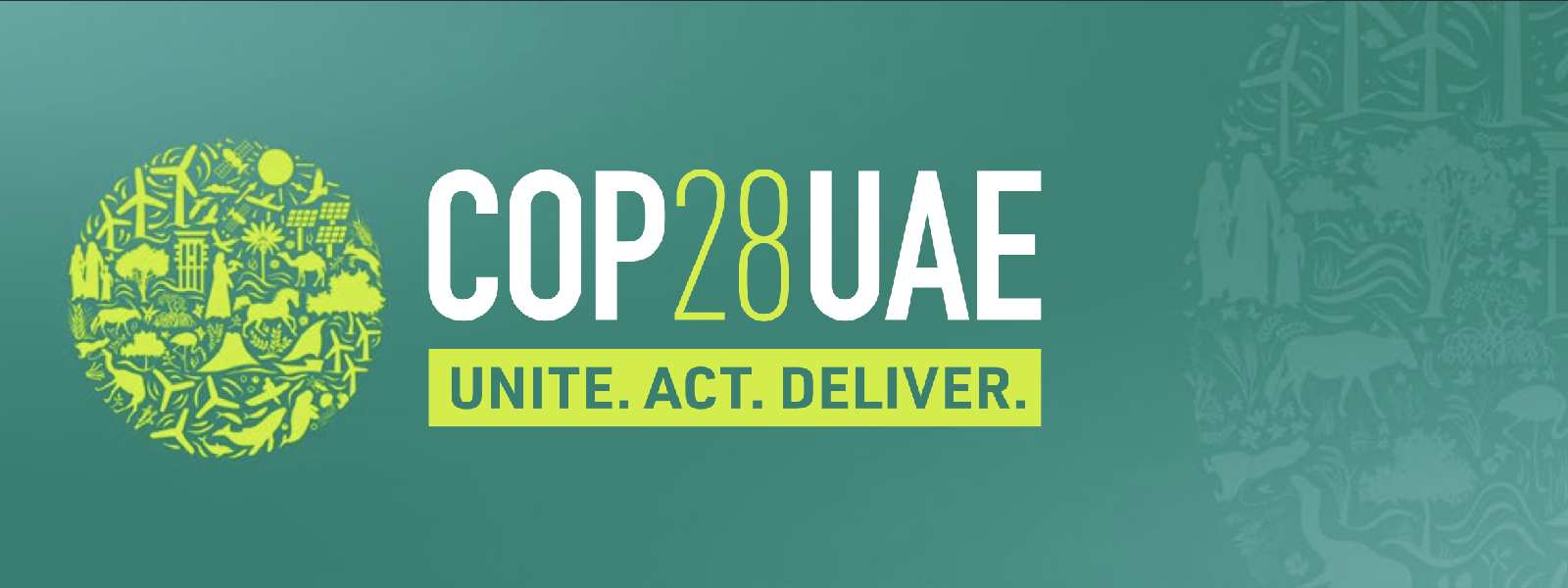.webp)

COP28: Ranil returns to Sri Lanka following multiple climate sessions in Dubai
COLOMBO (News 1st); Sri Lanka President Ranil Wickremesinghe returned to the country, concluding his visit to the COP28 Summit in the UAE.
Airport officials said the President returned to Sri Lanka on Monday (4) night.
COP stands for "Conference of the Parties", where the "parties" are the countries that signed up to the original UN climate agreement in 1992.
COP28 is the 28th annual United Nations (UN) climate meeting where governments will discuss how to limit and prepare for future climate change.
The summit is being held in Dubai, in the United Arab Emirates (UAE), from 30 November until 12 December 2023.
President Wickremesinghe left for COP28 on the 30th of November, and was accompanied by 03 ministers and 02 opposition MPs, along with twenty young participants passionate about environmental concerns.
President Advocates Bold Climate Action at COP28:
President Ranil Wickremesinghe acknowledged the historical significance of the UN Conference on Human Environment, emphasizing its goal to defend and improve the environment for present and future generations. He referenced the alarming findings of the UNEP Report of 2023, titled “Broken Promises,” which warns of a 3-degree Celsius increase in global temperatures by the end of the century.
Highlighting the challenges faced by developing countries, President Wickremesinghe stressed the disproportionate vulnerability and impact due to lower adaptive capacities in Finance, Technology, and Climate investments. He cited the Independent High-Level Expert Group Report on Climate Finance, which underscored the need for at least a US$ Trillion per annum to combat climate change.
The President commended the Government of the United Arab Emirates for hosting the crucial event and expressed gratitude for their warm hospitality
Expressing concern about the lack of concrete measures in the Transitional Committee’s report on funding arrangements, the President called for a more transparent approach, particularly addressing issues of global debt relief. He questioned the wisdom of avoiding contentious issues, emphasizing the urgency of the climate crisis.
President Wickremesinghe advocated for climate justice accessible to all nations and proposed a resolution for a Climate Justice Forum. This forum, agreed upon at the 5th Forum of the Ministers of Environmental Authorities of Asia Pacific, aims to provide a platform for constructive and proactive engagements, with the proposal scheduled for the UN Environment Assembly on 6th February 2024.
Underlining the critical nature of the current period, the President urged immediate action to find effective solutions, thinking outside the box and investing in the Tropical Belt to tackle the Triple Planetary Crisis. The Tropical Belt, covering 134 countries and 44% of the Earth’s surface, holds rich biodiversity and potential for renewable energy. President Wickremesinghe announced plans for a panel to report on the Tropical Belt Initiative, emphasizing its global impact.
As the current Chair of the Indian Ocean Rim Association (IORA), President Wickremesinghe linked the health of the Indian Ocean to climate change. He stressed the need for a sustainable Blue Economy to counter the adverse effects of rising sea levels, ocean acidification, coral bleaching, and extreme weather patterns.
President Wickremesinghe also revealed plans to establish the International Climate Change University (ICCU) for capacity building and advancing research, operationalizing it next year. The ICCU aims to contribute significantly to global efforts to limit global warming to 1.5 degrees Celsius.
In conclusion, President Wickremesinghe’s address at COP28 outlined a comprehensive approach, blending regional initiatives like the Tropical Belt and the Indian Ocean with global measures, reflecting Sri Lanka’s commitment to climate action and leadership on the international stage.
Wickremesinghe presents ‘Climate Justice Forum’:
President Ranil Wickremesinghe presented the Climate Justice Forum (CJF) at COP28, in Dubai emphasizing the critical importance of addressing climate issues with a sense of justice and equity.
The President was joined by prominent figures such as the former President of Maldives, Mohammed Nasheed, the Minister of Health of Uganda, Dr. Aceng Jane Ruth and the Executive Director of the United Nations Environment Program (UNEP), Inger Anderson.
Addressing the launch, President Wickremesinghe conveyed that the resolution of the Climate Justice Forum will be formally presented at the United Nations.
He described the CJF as an initial step to secure unwavering commitment from all parties involved in the collective effort.
President Wickremesinghe underscored that the scope of contribution extends beyond the capabilities of countries alone, emphasizing the significant role private entities can play. Furthermore, the President drew attention to the allocation of funds, noting that more financial resources are directed towards the war in Ukraine and the bombing of Gaza compared to what has been allocated for the Loss and Damages fund.
The President extended invitations to other concerned nations to join this initiative, presenting it as a viable solution to the increased threat of climate change. Furthermore the President has formally requested the collaboration and cooperation of esteemed organizations such as UNEP, UNDP and the EU to engage with interested countries in advancing the pioneering initiatives presented by Sri Lanka.
President Launches Tropical Belt Initiative:
President Ranil Wickremesinghe unveiled the ground-breaking Tropical Belt Initiative, a visionary plan aimed at addressing the challenges of global warming and securing sustainable development for nations within the tropical belt. The President’s speech highlighted the urgency of the initiative, emphasizing the need for a paradigm shift in climate funding and a multilateral approach to achieve meaningful results.
President Wickremesinghe began by addressing the uncertainties surrounding the 2030 target for peaking global temperatures. He stressed the 50-50 chance of meeting this crucial goal and questioned the feasibility of expecting substantial financial contributions from governments. Instead, he proposed a bold approach that involves both tropical and non-tropical countries, as well as collaboration between the government and the private sector.
The Tropical Belt Initiative focuses on harnessing commercial investments in vital natural resources within the tropical belt, such as forests, swamps, and mangroves. President Wickremesinghe emphasized the importance of making these investments commercially viable, unlocking the funds needed to combat global warming. He highlighted the initiative’s potential to attract private sector involvement, contributing to the ambitious goal of securing trillions of dollars annually.
Furthermore, President Wickremesinghe shed light on the collaboration with the Indian Ocean Rim Association to promote the blue economy and create a sustainable Indian Ocean. The combination of the tropical belt initiative and efforts in the Indian Ocean is envisioned to become the world’s largest global sink for carbon.
Climate Change University:
In a bid to address the pressing challenges posed by climate change and the need for robust institutional frameworks, President Ranil Wickremesinghe officially launched the International Climate Change University (ICCU) today (03). The President emphasized the necessity of institutional changes following the Paris Climate Agreement and highlighted the absence of alternative bodies to effectively tackle the on-going climate crisis.
President Wickremesinghe underlined that, despite the global commitment to the Paris Agreement, no significant institutional changes were implemented to assist the world in achieving the agreed-upon targets. Recognizing the urgency of the situation, the ICCU aims to fill this void by developing postgraduate-level capacity building, serving as a crucial support system for climate sciences.
The campus for the ICCU is set to be established on initially allocated 600 acres of land in Sri Lanka. However, President Wickremesinghe clarified that the university will not be confined to Sri Lanka; it will be an international stakeholder university, welcoming collaboration and contributions from around the world.
Highlighting the global nature of climate responsibility, President Wickremesinghe announced that Bangladesh, Seychelles and Moldova have already pledged their support to the ICCU. He emphasized that climate action is not the sole responsibility of any single nation and called upon the international community to join hands in this endeavour.
President Wickremesinghe concluded by urging nations and individuals worldwide to recognize the shared responsibility for climate issues and actively participate in the International Climate Change University. The launch of the ICCU marks a significant step towards fostering international collaboration, knowledge exchange and building a collective response to the urgent and complex challenges posed by climate change.
Other Articles
Featured News





.png )
-787819_550x300.jpg)
-787813_550x300.jpg)



-787789_550x300.jpg)


-785316_550x300.jpg)



















.gif)